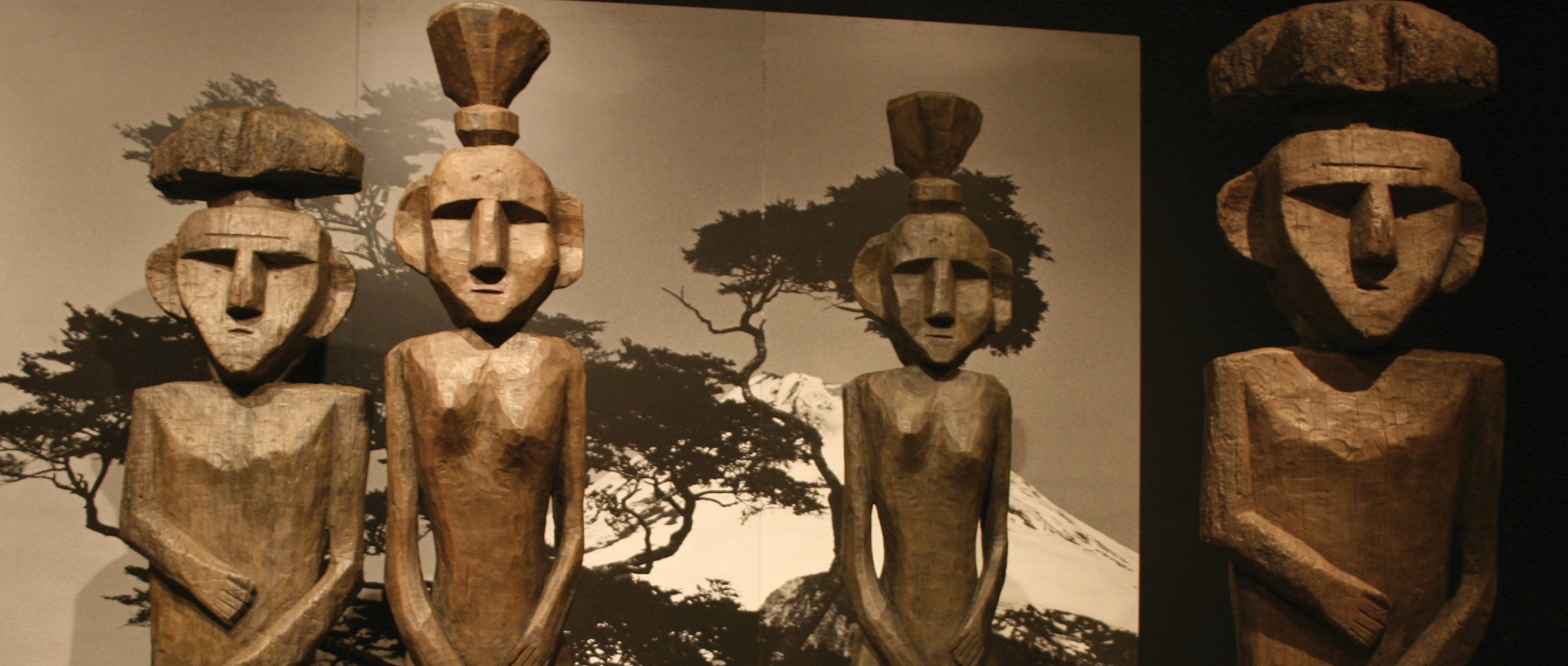As part of a community-based project in partnership with the Universidad de la Frontera (Temuco, Chile), students of SPAN 301: Intermediate Spanish provided English translations of poetry originally presented in the languages of Mapuzugun and Spanish for an event titled “Palabras Madre (Mother Words): Bridging Territories and People Through Poetry from Mapuche Writers in Translation“. The Spanish for Community event was designed to honour indigenous Mapuche writers from the Araucanía region of Chile.
Dr. Maria Carbonetti, Lecturer of Spanish, now describes her vision behind the class project, the translation process that students embarked on, along with the value and ethical considerations surrounding such work.


Special exhibit of Mapuche Funerary Statues at Capital Museum, Beijing. Source: Gary Todd (2008), CC0, via Wikimedia Commons.
About the Translation Project
“The core of Palabras Madre resides in the fact that we are teaching and learning Spanish, a colonial language, in an anglophone university located in a traditional and unceded indigenous territory.”
There were two core learning objectives for this student translation project. One was the linguistic aspect, which involved learning linguistic mediation skills when translating English to Spanish and vice versa, and to explore the field of translation as a possible career path. This process naturally involved the continuous development of reading, listening, speaking and writing skills in Spanish.
The second was the intercultural community-based aspect, which involved deepening students’ awareness of the role of indigenous and colonial languages in transnational contexts, and to reflect on and compare indigenous experiences in both territories where UBC and our partner institution, the Universidad de la Frontera (UFRO), are situated.
The project unfolded in several phases, as outlined below.
History and Context
“From the very beginning, students were confronted with ethical issues surrounding questions of power, voice and representation when doing translation work.”
By participating in sessions with our partners from UFRO—jointly coordinated with Dr. Carolina Navarrete and especially with professor and poet Jacqueline Caniguan—students learned about the history and context of Mapuche language, and the political implications of linguistic rights in Chile’s current constitutional process.
Students were tasked with reflecting on the political status of indigenous languages beyond the Spanish-speaking world, allowing them to learn more about the impact and continuity of colonialism, and their responsibility as students and citizens. For me, personally, it was a movement towards decolonizing my own teaching practice.
Translation
“This project is just the beginning of the bridge we are building to disseminate indigenous texts.”
After participating in two translation workshops, students worked on translating an anthology of poems into English that were originally presented in the languages of Mapuzugun and Spanish—a process that required reading comprehension, knowledge of vocabulary and grammar, contextualization, and applying translation strategies.
The students then created a blog post that displayed the original poem in Mapuche and Spanish beside their English translation, along with an image of a local landscape, scene, or artwork inspired by one of the verses they translated. The blog post also included a short reflection on the connections they found. This project is just the beginning of the bridge we are building to disseminate indigenous texts by expanding the class blog, among other sub-projects and exchanges with partners in the near future.
Palabras Madre Event
“The event crystalized students' reflections on the important role of languages for the survival of indigenous peoples and cultures, the transmission of knowledge and the protection of territories and resources.”
The project ended with an event titled Palabras Madre (Mother Words), which acted as a “bridge of poetry” between indigenous and colonial languages, between the North and the South, with the presence of representatives from both the Mapuche and the xʷməθkʷəy̓əm (Musqueam) indigenous communities. It was an evening of poetry reading in the languages of Mapuzugun and Spanish, with English translations presented by the students. We had the honour of having two remarkable guest speakers opening the event: the renowned Musqueam artist and knowledge-keeper Debra Sparrow, and Mapuche poet, linguist and activist Jacqueline Caniguan.
The core of Palabras Madre resides in the fact that we are teaching and learning Spanish, a colonial language, in an anglophone university located in a traditional and unceded indigenous territory (which is also the case for our partner organization, the Universidad Nacional de la Frontera, within the Mapuche Nation). It crystalized students’ reflections on the important role of languages for the survival of indigenous peoples and cultures, the transmission of knowledge and the protection of territories and resources.
Both orally and in writing, attendees were able to access some of the contemporary poetry produced by Chilean Mapuche poets. By listening to poetry in the Mapuche language, attendees were exposed to the beauty, sounds, words, ancestral knowledge and power of literary images and stories that bring knowledge of the South a bit closer to home in Canada. We are thankful for our special guests Mgtr. Jacqueline Caniguan (Mapuche Nation representative), Debra Sparrow (Musqueam Nation representative), and our UFRO poetry readers Dr. Juan Manuel Fierro Bustos, Dra. Carolina Navarrete and Mg. Fabián Leal Ulloa.


